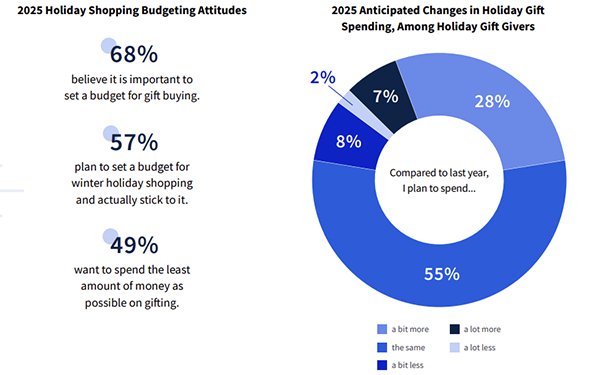
Budgets, the economy, politics and current events
will change the way consumers view holiday gift purchases this year. All these variables will influence whether consumers increase or decrease the amount they spend on holiday gift giving in 2025.
Some 41% of holiday gift givers in 2025 said recent political changes will change their outlook on holiday gifting.
Basis Technologies released holiday data on Thursday that shows if
advertisers want to connect with consumers this holiday season, they may need to rethink their media-buying strategies.
New priorities have emerged in digital. Many more consumers are
willing to experiment with artificial intelligence (AI) as they look for advice on what to give, according to Maggie Nemoy, Basis vice president of research and insights.
“People
are leaning into AI for the ideas,” she said. “Sixteen percent of gift givers in the 2025 holiday survey say it would be a good way to come up with ideas,” especially as they attempt
to stick to a budget.
advertisement
advertisement
With prices on the rise for many items, consumers are conflicted with the idea that if they want to continue gifting this year, they will need to spend more, she
said.
Some 68% of consumers believe that this year it is important to set a budget for holiday shopping, and 57% think they will set a budget and stick to it.
“Although our
survey was completed before the situation between Israel and Iran, these indicators can be used to forecast how consumers will react to the latest conflict,” Nemoy said. “If the conflict
in Iran escalates, the U.S. economy will likely feel the effects, and therefore holiday and consumer spending may decrease.”
The in-depth research — 2025 Holiday Shopping &
Advertising Trends Report — is based on a survey of 2,000 U.S. consumers age 16 and older in partnership with GlobalWebIndex (GWI). The data provides valuable insights into the evolving
landscape of holiday shopping — providing marketers with a strategic advantage when planning advertising strategies for the 2025 holiday season.
The data exemplifies the top 15 trends
set to shape holiday shopping and advertising in 2025. Among those planning to spend less this holiday season, 55% of consumers say this is because of concerns around the economy and inflation, while
53% cite uncertainties around the future and not wanting to spend a lot, and 36% cited being worried about social and political events affecting their finances.
Social commerce is gaining
ground, especially among younger generations, with 35% of Gen Z and 26% of millennials saying they will buy gifts directly through social media this year. Instagram and Facebook lead the way as social
shoppers' go-to platforms, with TikTok close behind.
Eighteen percent of respondents say they will buy gifts through social media. Among these respondents, the top channels they plan to
purchase through are Instagram, at 52% followed by Facebook with 51%; TikTok at 47%; and YouTube with 40%.
Twenty-five percent of consumers participating in the survey said they would purchase
more gifts from low-cost online retailers such as Temu or Shein – up 19% from the percentage who said they did in 2024.
Holiday shopping will begin earlier this year. Many plan to start
as early as September, with 66% citing the need to avoid shipping delays, while 63% want to secure items before they sell out, and 57% want to take advantage of sales throughout the year.
Black Friday and Cyber Monday are losing their prominence. Cyber Week shopping remains steady, but fewer shoppers see it as essential. Many say they will already be finished with their shopping by
then, or that deals are available throughout the season, making these tentpole events feel less special. For brands, it’s a cue to not over-rely on Black Friday and Cyber Monday alone
Shoppers continue to blend online and in-person channels, with most gift buyers saying they will shop across both in the 2025 winter holiday season. Even on Black Friday — a traditionally
high-traffic in-store event — online shopping dominated in 2024. While digital channels are clearly central, in-store still plays a meaningful role.